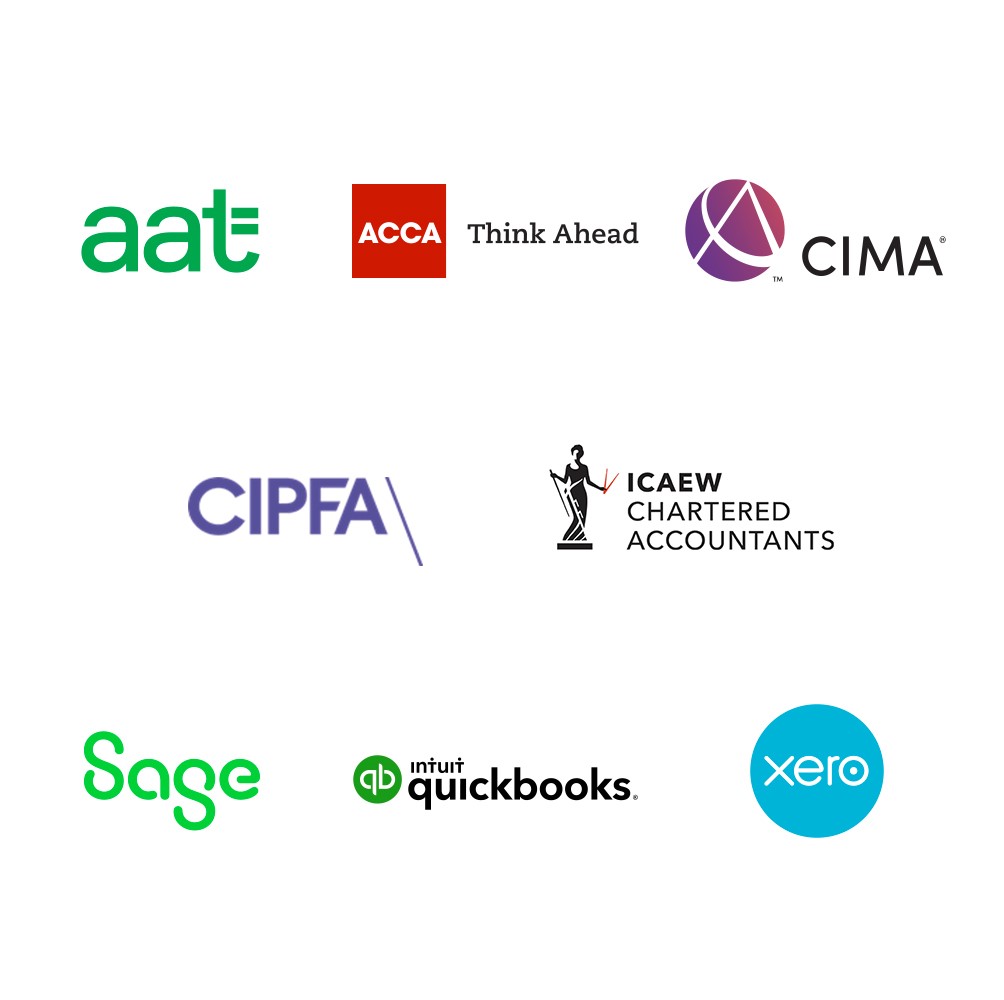Accountancy Qualifications
Accounting Qualifications
Becoming an Accountant in the UK does not always require formal qualifications, and there are many accountancy professionals who consider themselves qualified by experience (QBE). However, it is becoming increasingly hard to advance a finance career without qualifications as they have become an expectation of many employers.
While it's not mandatory to become qualified to work in accounting, having a professional qualification is highly regarded and can significantly enhance your career prospects. Here are the common routes to becoming an accountant.


Becoming an Accountant
Traditional Education
A-Level or equivalent: Start by completing your A-levels or an equivalent qualification, with a focus on subjects like mathematics, economics, business studies, or accounting.
Pursue a bachelor's degree in accounting, finance, or a related field. A common choice is a Bachelor of Science (BSc) or Bachelor of Arts (BA) in Accounting and Finance. This typically takes three years to complete.
Alternatives to Traditional Education
For those who do not wish to attend University, there are a number of alternative routes to becoming an accountant.
Apprenticeships and employer qualification sponsorship
In the UK, apprenticeships are available for aspiring accountants. You can work for an employer while studying towards your professional accounting qualification. These apprenticeships often combine on-the-job training and education.
Online Courses and MOOCs
There are numerous online courses and Massive Open Online Courses (MOOCs) that can help you acquire accounting knowledge and skills. Platforms like Coursera, edX, and Udemy offer courses in accounting and finance. While these courses may not lead to a professional qualification on their own, they can be a valuable source of knowledge and skills.
Practical Experience and Self-Study
In some cases, you can gain experience in entry-level accounting positions and work your way up through on-the-job learning and self-study. While this path may take longer and limit your career prospects, it's possible to build a career in accounting with dedication and continuous learning.
Advancing through the AAT syllabus offers an earlier entry point in accounting education through to fully qualified and is an excellent alternative to University.
How are Accounting Qualifications different?
Knowing which qualification to pursue is a serious consideration. To help you decide which qualifications best meet your career goals, we take a more detailed look at what each course entails
To become fully qualified with most professional bodies you are usually required to complete a period of practical work experience, often referred to as a training contract or work experience requirement. This allows you to apply your academic knowledge in a real-world accounting setting. The typical time to complete each course is 4-5 years, but this also depends on the amount of study time allocated. Most courses offer flexible learning to meet your work obligations and chosen pace of study.
ACA (ICAEW)
The ACA (Associate Chartered Accountant) qualification is offered by the Institute of Chartered Accountants in England and Wales (ICAEW). This is comparible to a Masters degree or postgraduate Diploma and is targeted at finance professionals looking to advance their careers into senior roles.
ACCA (The Association of Chartered Certified Accountants)
The Association of Chartered Certified Accountants (ACCA) offers the ACCA qualification. The ACCA is aimed at individuals looking to qualify as a professional accountant. Targeted at individuals at various stages in their career, including recent graduates and professionals already working in finance and accounting.
CIMA (Chartered Institute of Management Accountants)
CIMA (Chartered Institute of Management Accountants) – management accounting qualification. Providing the skills to interpret financial data and prepare reports using business knowledge to help company stakeholders make decisions.
CIPFA (Chartered Institute of Public Finance and Accountancy)
CIPFA (Chartered Institute of Public Finance and Accountancy) for public sector accountants. The CIPFA qualification is specifically targeted at individuals aiming to build a career in public finance, particularly within the public sector and government-related organisations.
AAT (Association of Accounting Technicians)
AAT (Association of Accounting Technicians) offers an easily accessed entry point into accounting through to a Diploma level qualification. The AAT qualification is geared toward individuals at the early stages of their accounting career or those seeking entry-level positions. It is a vocational qualification that provides a solid foundation of practical skills and knowledge in accounting and finance.
University Degrees
Pursue a bachelor's degree in accounting, finance, or a related field. A common choice is a Bachelor of Science (BSc) or Bachelor of Arts (BA) in Accounting and Finance. This typically takes three years to complete.
Software Vendors
Training and certification in industry specific accountancy softwares, such as Sage, Xero and Intuit Quickbooks. Although not classed as qualifications, these certificates can help to advance early stage careers.
Latest Accountancy Jobs
Accountant
A growing accounting firm with a varied client base based around the UK and a small portfolio of international clients based in the UAE and Europe is looking for someone with ambition and the drive to deliver their services at a consistently high level who’ll help them retain the excellent reputation they already have in...
Read moreBookkeeper
A global creative agency based in Central London is seeking a capable Bookkeeper to join the team on a permanent basis. This role incorporates hybrid working so you’re able to work from home 2-3 days per week. The successful candidate will manage the bookkeeping for several small businesses that partner with the agency. You will...
Read moreMarket Risk Analyst
A global market leading Oil and Gas Trading firm is seeking an experienced Market Risk Analyst to monitor and evaluate daily market risk, i.e. exposures to price, volatility and liquidity risks. In this role you’ll analyse using relevant quantitative analysis of the current market trends as well as anticipating emerging risks that are affecting the...
Read moreAccountancy Salary Guide
Demand for accounting professionals remains robust.
Explore salaries for accountancy & finance roles in your region.
Stay informed with the very latest Accountancy salary data to maintain and attract key talent. Explore salaries for Finance roles in your region.